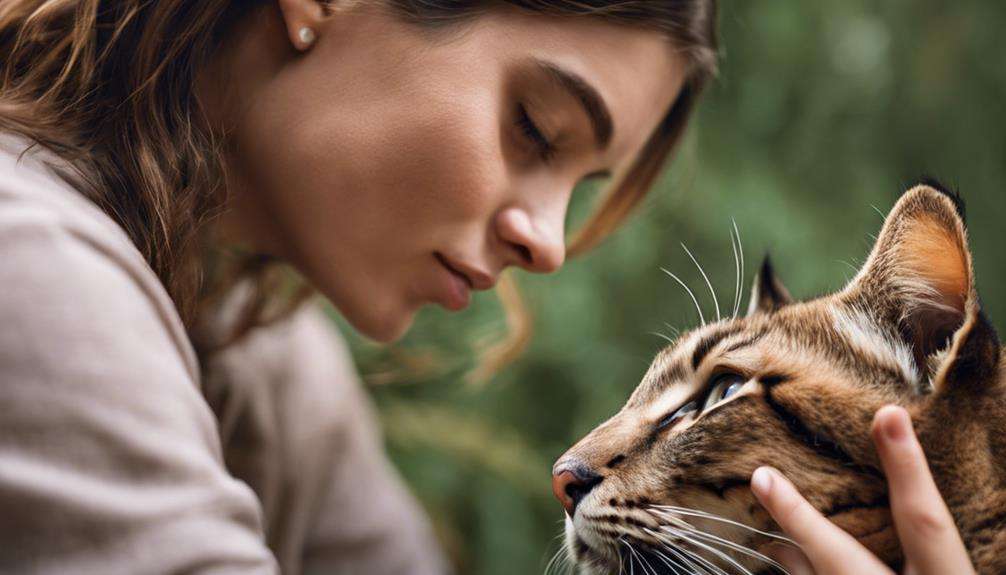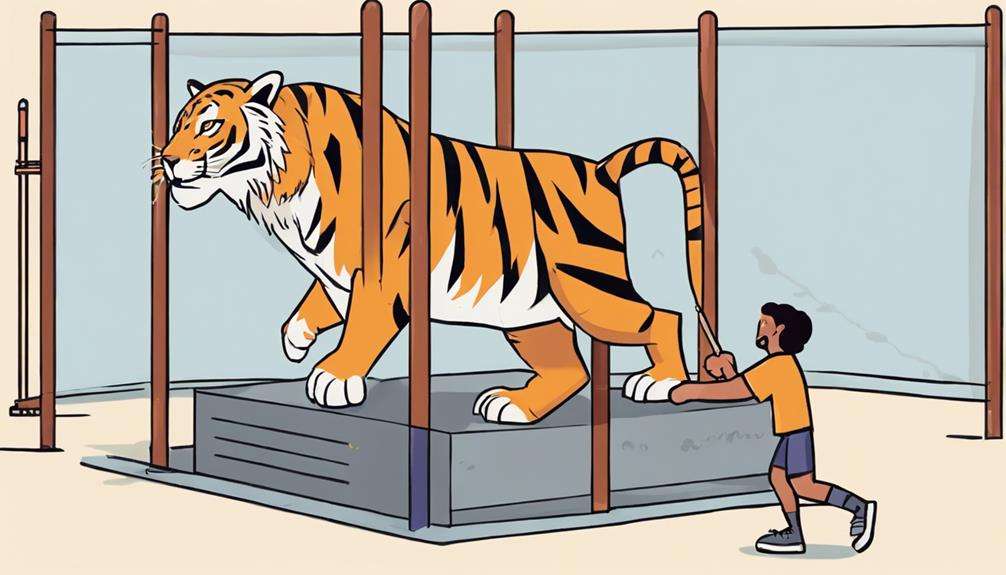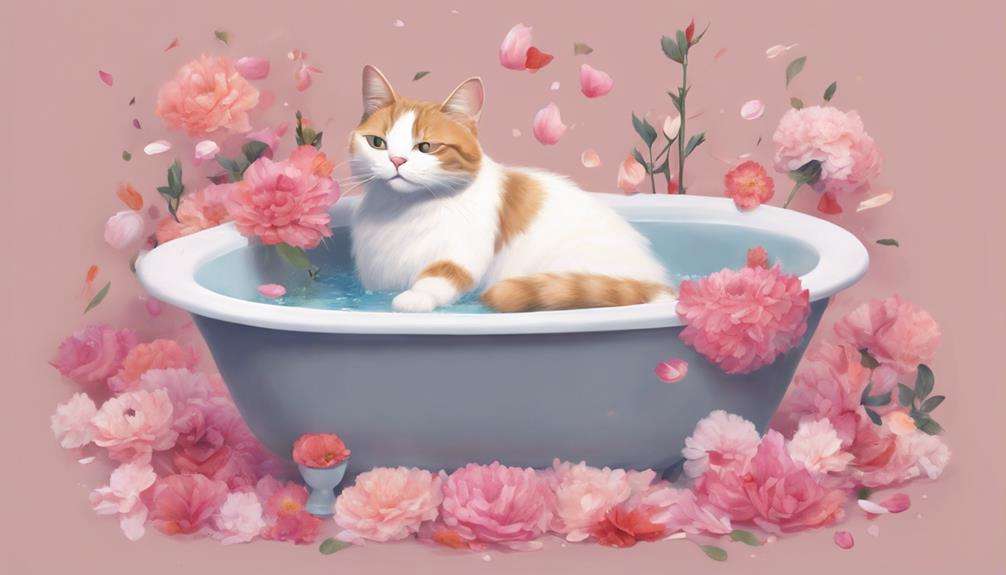Imagine trying to tame a wild storm; that's akin to the challenge of domesticating a big cat. Their untamed essence, rooted in centuries of evolution, sets them apart from your typical household pet.
The allure of their majestic presence can be enchanting, but behind their mesmerizing gaze lies a complexity that demands respect and understanding.
As we explore the intricacies of what sets big cats apart as pets, we unveil a world where danger dances with beauty, and where the line between wild and domestic blurs in ways that beckon further exploration.
Key Takeaways
- Big cats' predatory instincts and behaviors pose unique challenges in a domestic setting.
- Legal restrictions and ownership regulations limit the feasibility of keeping big cats as pets.
- Meeting specialized healthcare and dietary needs is essential for big cats' well-being.
- Providing enriching environments and proper care are crucial for big cats' physical and mental health.
Big Cat Behavior Insights
Understanding the innate predatory instincts of big cats is crucial in comprehending their behavior towards humans and other animals. Big cats, such as lions, tigers, and leopards, have evolved over millions of years to be apex predators in their natural habitats. These instincts make them unsuitable as exotic pets, as their predatory and destructive behaviors can pose a significant threat to both humans and other animals. Despite any training or perceived domestication, the genetic drive to hunt and assert dominance remains strong in these majestic creatures.
When kept in captivity, big cats may exhibit unpredictable behaviors that even trained professionals, like zookeepers, find challenging to manage. Their size and strength, coupled with their agility and speed, make them formidable animals that should be respected from a safe distance. Private owners attempting to care for big cats face numerous obstacles, including specialized healthcare needs like vaccinations and treatments for feline diseases such as FIV and FeLV. Overall, the unique behavioral traits of big cats highlight the importance of leaving these magnificent animals in their natural habitats rather than attempting to domesticate them.
Legalities of Owning Exotic Felines
Given the inherent risks associated with keeping big cats as pets and the complex behavioral characteristics they exhibit, it's essential to explore the legalities surrounding the ownership of exotic felines.
Legalities of Owning Exotic Felines
- The Captive Wildlife Safety Act restricts the exotic cat trade for pets in the U.S.
- Exceptions for circuses, zoos, and licensed facilities allow the ownership of exotic felines.
- There's been a decrease in big cat ownership in the United States from 2011 to 2016.
Ownership of exotic felids in the United States demands compliance with various laws to ensure the safety of both the animals and the public. The regulations aim to reduce the risk of incidents related to keeping these powerful predators in captivity.
Despite the allure of owning exotic felines, potential owners must understand the heavy financial and legal responsibilities involved. These measures are crucial to prevent instances of neglect, abuse, and harm that may arise from inadequate care and understanding of the animals' needs.
Dietary Needs of Big Cats
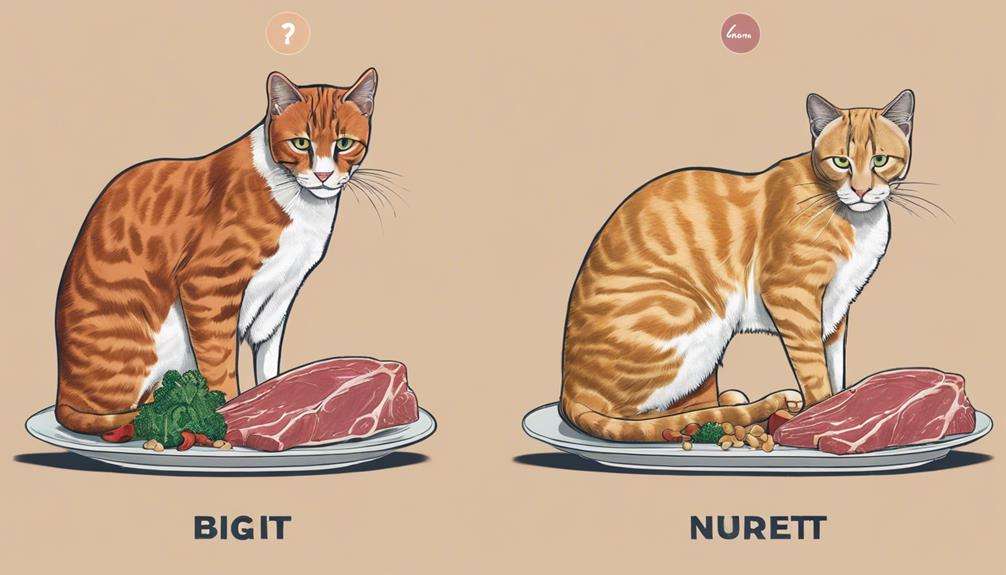
Big cats have highly specialized dietary requirements that must be meticulously met to ensure their health and vitality. Their diet should consist primarily of raw meat, bones, and organs to replicate their natural eating habits in the wild.
It's crucial to provide the correct balance of essential nutrients such as taurine, calcium, and vitamins to support their overall well-being.
Specialized Dietary Requirements
When considering the specialized dietary requirements of big cats, it's essential to understand their carnivorous nature and the specific nutritional components necessary for their optimal health.
- Big cats, being wild cats, require a diet primarily consisting of raw meat, bones, and organs to meet their nutritional needs adequately.
- Their diet may need supplementation with vitamins and minerals to ensure they receive all the essential nutrients.
- Feeding big cats can be costly due to the high quality and quantity of meat required, making them expensive to maintain as pets.
Understanding and meeting these dietary needs are crucial for the health and well-being of big cats in captivity. It's vital to provide a balanced diet to prevent deficiencies and maintain their overall health.
Importance of Balanced Nutrition
A crucial aspect in ensuring the health and well-being of big cats is providing them with a meticulously balanced nutrition plan tailored to their carnivorous dietary needs. Big cats, like their domestic counterparts, are obligate carnivores and require a diet rich in raw meat, bones, and organs to meet their nutritional requirements. This diet should also contain essential vitamins, minerals, and taurine to support their overall health, maintaining muscle mass, energy levels, and a healthy coat.
Feeding schedules for big cats must be carefully managed based on species, age, and activity level to prevent issues such as obesity or malnutrition. Inadequate nutrition can lead to health problems like obesity, dental issues, and digestive disorders, emphasizing the critical role of balanced nutrition in the care of big cats.
Unique Housing Requirements
To ensure the well-being of big cats in captivity, constructing spacious and secure outdoor enclosures that mirror their natural habitat is imperative. These enclosures must be designed with specific considerations in mind:
- Climbing Structures: Big cats, as exotic felids, have a natural inclination to climb. Providing sturdy trees, platforms, and branches within their enclosure allows them to exhibit this behavior safely.
- Hiding Spots: Mimicking the dense vegetation found in their natural habitats, incorporating caves, dens, or thick vegetation provides big cats with areas to retreat and feel secure.
- Enrichment Activities: Keeping these animals mentally stimulated is crucial. Toys, puzzles, and scent trails can help prevent boredom and encourage natural behaviors in big cats.
Health Considerations for Exotic Felines
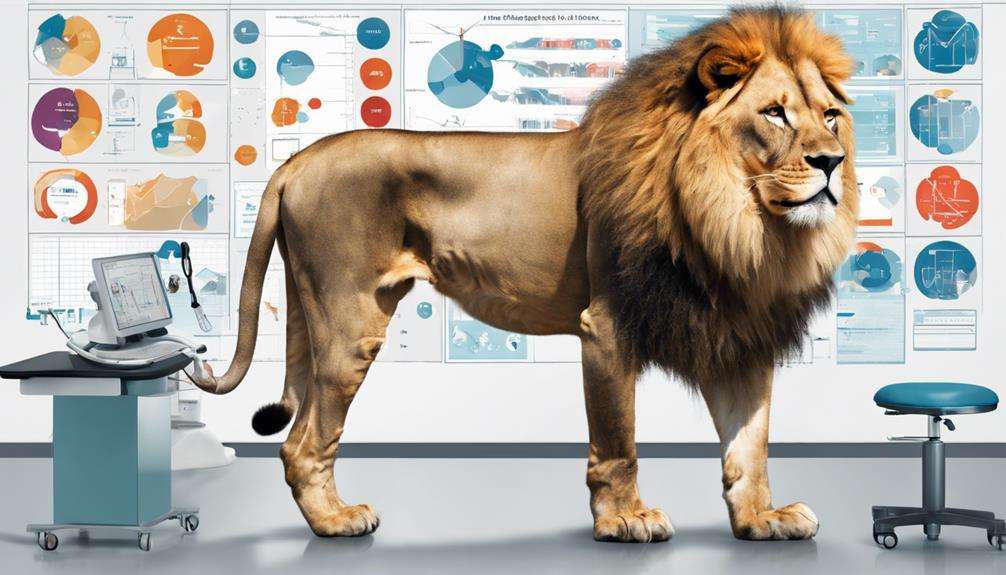
When considering the health of exotic felines, it's crucial to focus on their specialized diet, tailored veterinary care, and unique exercise requirements.
Ensuring these aspects are meticulously addressed can help mitigate the risks associated with owning big cats as pets.
Remember that the complexities of their health needs demand a cautious and informed approach to guarantee their well-being.
Exotic Feline Diet
Ensuring the dietary requirements of exotic felines are met with precision is paramount to their well-being and longevity. Exotic felines have specific nutritional needs that must be addressed carefully:
- Exotic felines require a carnivorous diet consisting of raw meat and supplements to meet their nutritional needs.
- Their diet should mimic what they'd eat in the wild to ensure proper health and digestion.
- Lack of proper nutrition can lead to serious health problems like obesity, malnutrition, and digestive issues in exotic felines.
To prevent nutritional imbalances and maintain their overall well-being, specialized veterinary care and regular monitoring of their diet are essential. Proper nutrition plays a critical role in the health and vitality of these magnificent creatures.
Veterinary Care Tips
Specialized veterinary care is essential for addressing the unique health challenges and risks faced by exotic felines. Due to their distinct physiology and dietary requirements, big cats require regular veterinary check-ups to monitor their health and prevent potential illnesses.
These check-ups may involve specific vaccinations and treatments that differ from those used for domestic cats. The cost of veterinary care for big cats can be high, considering their size, dietary needs, and susceptibility to health issues.
It's crucial to find a veterinarian with experience in treating exotic felines to ensure proper care and management. Regular consultations with a knowledgeable veterinarian are vital for maintaining the health and well-being of big cats in a domestic setting.
Exercise Needs for Felines
To address the exercise needs of exotic felines effectively, meticulous planning and careful observation of their behaviors are crucial. When considering the exercise requirements of cat species kept as pets, it's important to provide:
- Adequate Space: Big cats need room to roam and engage in natural behaviors to stay healthy and happy.
- Enrichment Activities: Incorporating climbing structures, toys, and puzzles can stimulate felines mentally and physically, promoting their overall well-being.
- Tailored Exercise Routines: Developing specific exercise routines based on the needs of each cat species is crucial to ensure their physical health and quality of life.
Understanding and meeting the exercise needs of exotic felines is essential for preventing health issues and promoting a fulfilling life as pets.
Exercise Regimen for Big Cats

Big cats in captivity should have a carefully structured exercise regimen tailored to their species and individual needs to ensure optimal health and well-being. These magnificent creatures, with their natural instincts for hunting and roaming vast territories, require ample space and enriching environments to mimic their wild habitats for adequate exercise.
Regular physical activity is crucial for the overall health and mental stimulation of big cats. Enrichment activities play a vital role in encouraging exercise among these majestic animals; climbing structures, toys, and interactive feeding methods can promote movement and engagement. Providing opportunities for play and hunting behaviors is essential to fulfill the exercise needs of big cats.
Each species can live a fulfilling life in captivity if provided with tailored and structured exercise routines that cater to their specific requirements. By focusing on individual needs and species-specific behaviors, caregivers can ensure that big cats maintain their physical health and mental well-being.
Size Variations Among Big Cats
Understanding the varying sizes among different big cat species is essential for tailoring their care and living environments appropriately to ensure their well-being as pets.
Big cats exhibit significant differences in size, with tigers being one of the largest cat breeds, reaching lengths of up to 10 feet and weighing up to 660 pounds. On the other end of the spectrum, cheetahs are considerably smaller, measuring around 5 feet in length and weighing between 49 to 140 pounds. Snow leopards fall in between, weighing between 60 to 120 pounds.
These size differences among big cat species directly impact their housing requirements, spatial needs, and dietary considerations. As a potential owner, it's crucial to understand the specific size variations among big cats to provide adequate care and living conditions that cater to their individual needs, ensuring a safe and healthy environment for these majestic animals in your home.
Frequently Asked Questions
What Makes Big Cats Unique?
Big cats stand out due to their impressive size, strength, and predatory nature. Interacting with these exotic pets demands caution. Ownership requires dedication to conservation efforts and understanding the responsibility of caring for such majestic yet dangerous animals.
Why Do People Keep Big Cats as Pets?
You keep big cats as pets for their unique allure, the bonding experience, and the exotic companionship they offer. Despite the risks, the thrill of owning a powerful animal like a big cat can be irresistible to some individuals.
How Are Big Cats Unlike Pet Cats?
You can't just cuddle big cats like your pet feline. Their socialization challenges and aggressive behaviors make them unsuitable for normal homes. Training and managing their space needs are complex tasks that require caution and expertise.
Which Big Cat Makes the Best Pet?
Cheetahs are often considered the best big cat for pet ownership due to their relatively docile nature, historical companionship with humans, and fascinating social behaviors. Legal restrictions and safety concerns should be carefully considered.
Conclusion
You have delved into the unique characteristics of big cats as pets, but have you considered the theory that their predatory instincts can never truly be tamed?
Despite efforts to domesticate these majestic creatures, their wild nature may always linger beneath the surface.
Further research into the behavioral patterns of big cats in captivity could provide valuable insights into the complexities of owning such exotic animals.
Proceed with caution and respect for these magnificent creatures.

